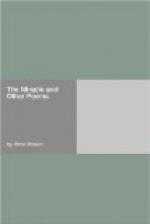“Stay thou with thy old nurse, Beloved—she
sitteth in the hall—
And she will tell thee wondrous tales,
to win from thee a smile,
Then take thy supper by her side, and when deep night
doth fall,
Go to the tower, whence I’ll come,
but in a little while.”
Arrayed in her most lovely robes she took her stately
way
By courtiers unattended, through the palace
vast and still.
Her beauty was a thing to hold all bitterness at bay,
To move the hearts of men, and bend their
spirits to her will!
She passed beneath the rose red lights that hung from
roof and door,
And by unseeing gods, where curled an
incense, blue and sweet;
As one who walks in sleep she crossed the cool mosaic
floor,
That echoed to the music of her little
sandalled feet.
She reached the council chamber and there entered
silently;—
But though the bowing wise men had been
reeds the wind could sway
Would have noted them as little. She only seemed
to see
One face, inscrutable and dark, toward
which she took her way.
The king sat still as Fate. “Most High,”
she said, “I come for truth
Of this new threat of vengeance.
There is horror in the air;—
The Ethiopian runner hath brought word to me in sooth
Blood is sprinkled on the door-posts of
the Hebrews everywhere!”
“There are rumours—so he sayeth—of
an Angel who will slay
The first-born sons of Egypt—should
these bondsmen not depart.
Thy people weep in anguish—I myself must
hear thee say—
The Hebrew leader threatens no such danger
to my heart—
“He is my heart—my inner heart;—0
straight he is and strong!
To me he meaneth Egypt—Egypt
meaneth but my son—
So I would take him swiftly toward the land where
I belong
To return to thee in safety when these
troubles all are done.”
“The streets are filled with mourners;—every
day more tears are shed;
The embalmers have grown weary—they
will not work for gold—
And everywhere the eye doth see processions of the
dead,
Till they seem but mocking phantoms, we
watch unmoved and cold.”
“Thou wilt not let the Hebrews go—I
read it in thine eyes—
There are no gods in Egypt—there
is nothing but thy Will—
That sets itself against some force that yet in Strength
will rise
But to silence all thine answers and bid
thy voice be still.”
Then Pharaoh leaned down toward her: “0
most beautiful!” he said,
“There is not a man who liveth dare
say so to my face;
And truly were there such a one ’twere better
he were dead,
For dead men suffer nothing.—Yet
I pray thee of thy grace
“Have patience now to hear me. ’Tis
as the Ethiope heard.
They threatened all the first-born;—but
the tower is brass and stone;
There my son shall stay to-night, guarded well, I
give thee word.—
Where armies could not enter—can
one angel pass alone?




